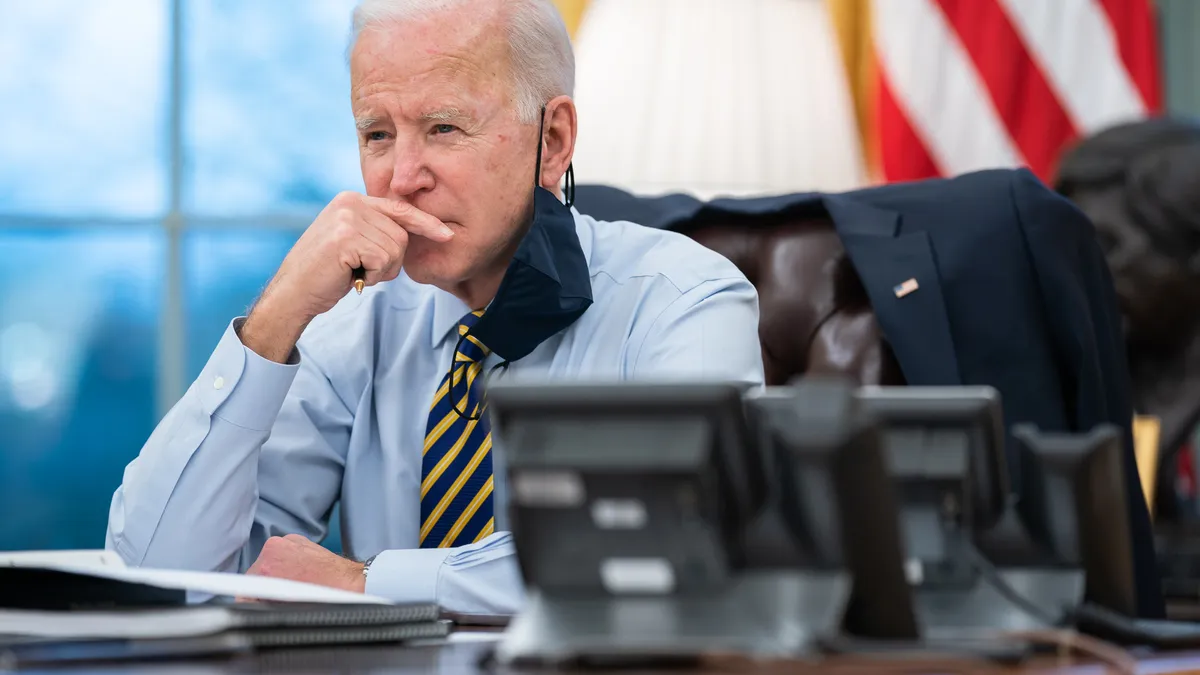Dive Brief:
- President Joe Biden is asking Congress to authorize $109 billion to make two years of a degree or credential at a community college free, including for unauthorized immigrants.
- The request is part of the $1.8 trillion American Families Plan, which also calls for roughly $39 billion to subsidize two years of tuition at four-year minority-serving schools, as well as $80 billion to increase the Pell Grant and additional funds for completion initiatives.
- Bills put forward by Democratic lawmakers in recent weeks would likely be a starting point for addressing these proposals, but Republicans are likely to resist the increased spending.
Dive Insight:
Biden's plan would let students use their free community college benefit over three or four years, depending on their circumstances. And it would add as much as $1,400 to the value of the federal Pell Grant, which is $6,495 in the 2021-22 academic year. Biden asked for a $400 increase to the grant in his recent budget request for the U.S. Department of Education. Higher education groups have been pressing Biden to double the grant and index it to inflation.
His latest proposal also asks Congress to provide $39 billion to subsidize tuition at four-year minority-serving institutions for students whose families earn less than $125,000 annually. Another $7 billion would go to the schools for a variety of academic and administrative uses.
The pitch also calls for $62 billion in grants for colleges that employ "innovative, proven" strategies for getting students to graduation. Schools that enroll many low-income students, particularly community colleges, are a focus for the funds.
J. Noah Brown, president and CEO of the Association of Community College Trustees, called the inclusion of the completion-focused measure "critically important."
A separate, $2 trillion proposal in March for upgrading the nation's roads, bridges and other infrastructure included requests for funding physical and technological improvements at community colleges and MSIs.
Several recent Democratic legislative proposals offer a starting point for Congress to address the pair of spending plans, which the administration is billing as infrastructure investments. The bills call on the federal government to provide funding to help states offer free college programs.
The funding mechanism will be important, Brown said. "Whatever we do, we have to make sure that we don't give states an out in terms of continuing to support their public institutions."
But getting through Congress will be a challenge, said Jonathan Fansmith, director of government relations at the American Council on Education, which called the proposal a "vital first step."
Republicans pushed back on Biden's first infrastructure pitch. And the latest ask includes few bipartisan elements plus high tax increases, Fansmith said, making it unlikely to get GOP support. Democrats could use a process called reconciliation to pass the measures, though there are limits on policies moved that way.
Still, Fansmith said, the federal government partnering with states on free community college would be a sea change. Some four-year colleges would benefit from a stronger two-year college pipeline, while others that tend to serve more price-sensitive students may be impacted in how they recruit and retain students, Fansmith said.
For-profit colleges would likely not benefit from the expansion of free community college though they could from the proposed Pell Grant increase, BMO Capital Markets senior analyst Jeff Silber wrote in a note Wednesday. One recent bill would disqualify for-profits from increased Pell funds.
The proposal would have "a transformative impact on institutions," Fansmith said, "maybe not because they're competing for the same students but simply because the landscape will shift and there'll be changes in how everyone has to do business."















